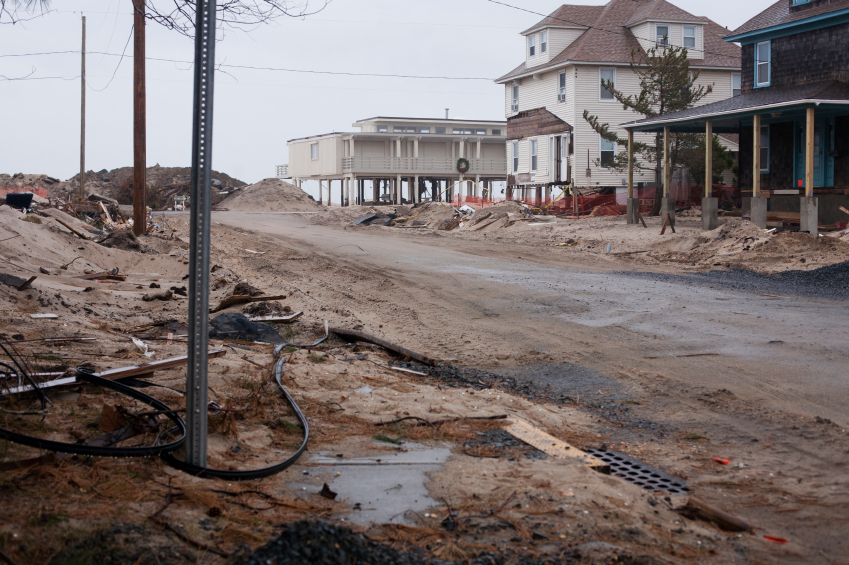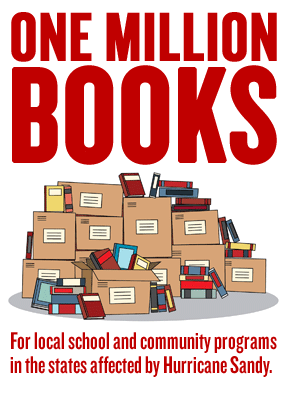When heads of state and other leaders of 195 nations reached a landmark accord at the recent United Nations COP21 conference on climate change in Paris, they focused primarily on sea level rise, droughts, loss of biodiversity, and ways to decrease greenhouse gas emissions in order to reduce these consequences. But arguably the most serious and widespread impacts of climate change are those that are hazardous to the health of people.
The post Climate change poses risks to your health appeared first on OUPblog.
In the aftermath of Superstorm Sandy, one group of dedicated social work scholars at Rutgers University explored options to offer funding and training programs to clients who were hit hard. One of their more recent initiatives provided subscriptions to the Encyclopedia of Social Work Online to seven individuals who needed access to scholarly research. We spoke to Kathleen Pottick, professor in Rutgers University’s School of Social Work, who spearheaded this endeavor to hear the story behind their work.
How did the Rutgers grant for this project come about?
While we were struggling — as a university, as a community, as a state — to recover from Superstorm Sandy in October 2012, our development director recognized an opportunity for funding through foundations supporting Sandy relief efforts in New Jersey. We knew that our students were in field agencies throughout the state serving those directly impacted by the storm, and we wanted to give those students the tools to help those surviving this natural disaster. Many of our survivors were newly needy, and our students had to be trained in dealing with this population.
We believed there might be private foundation backing to develop training programs because they would have an immediate, concrete effect on helping clients. After we received interest from a foundation, several key faculty and staff sat together to map the best strategy that would make the largest impact in our state. We presented our proposal within the week, and they gave us a budget to implement this disaster training and service work.
What was your initial aim?
Our initial aim was to respond quickly to this disaster to assist victims of the event, while, for the first time, integrating graduate social work students into disaster-related clinical and non-profit organization management agencies through field placements. We wanted students quickly to be able to provide concrete services, as well as directed mental health counseling.
How will this work support future goals at the School of Social Work?
Students participating in the program were called Disaster Fellows and given supplemental training on disaster response and disaster mental health counseling, in addition to their usual advanced social work training. They applied their training through supervised field placements, mostly in nontraditional, newly developed agency locations, and we now have a base of alumni who can take those skills to their professional agencies throughout the state, and beyond. There are opportunities to present our work at national and regional conferences to ensure the human experience is not overlooked, as environmentalists and climatologists discuss Sandy’s impact. The school will continue to enhance its reputation within the university as an integral collaborator on current issues, as well as a leader in innovative responses to disaster.

How did you and Cynthia Franklin, Editor of Encyclopedia of Social Work online, come together to start discussing your plans? Why did you select Encyclopedia of Social Work to assist the research of these individuals?
It was important that our agency partners continued to feel support from the School of Social Work as they continued to serve clients in their communities, especially for long-term effects of the Sandy disaster, after our original students were gone. We wanted those agencies to have the most current and comprehensive information at their fingertips. The Encyclopedia of Social Work was the first place we went because we knew that the continuously update online function, with links to relevant articles and journals, would be most effective for these partner agencies. Our partners could easily search for specific, up-to-the-minute information without thumbing through pages of a static text.
When we told agency directors that they would have access to the Encyclopedia, they were extremely appreciative. The director of the Mental Health Association of New Jersey said, “The Encyclopedia will help us tremendously with our ongoing efforts to enhance the education and training of our recovery community as we continue to work with the survivors of Hurricane Sandy who require ongoing attention. We will also use this resource in Mental Health First-Aid and other disaster-related trainings that are conducted throughout New Jersey.”
Another community agency director stated, “This subscription will be one more useful tool in our ‘resource toolbox’ to have on hand when assisting individuals and families who have been exposed to a traumatic life event such as Hurricane Sandy and who need professional guidance.”
For readers not residing in this part of the country, can you elaborate on how and why Sandy was particularly catastrophic for New Jersey residents?
The superstorm caused unprecedented havoc across a broad swath of the Middle Atlantic region of the United States, and unlike normal storms, its hurricane-force winds did not dissipate quickly once the storm got over land, but extended approximately 100 miles inland. People who had never experienced hardship in their lives were drastically affected, and in New Jersey, many of the survivors of this storm lived in middle- and upper-class areas. A very large number of residents were seeking help from local agencies for the first time. They didn’t know what resources were available to them, nor did they understand the effects this disaster would have on them for months and years to come. In some areas of the state, entire communities were destroyed, and survivors from them had to relocate completely, leaving not just their physical residence, but their neighbors, stores, resources, and their general sense of community. The theme for this year’s National Social Work month, All People Matter, is quite relevant to us in New Jersey because we have stood together and have shown great resiliency as our communities rebuild.
In your opinion, what challenges are social workers facing in the current workforce? What about in education or research settings?
It is not specific challenges, but rather the breadth of them, that poses the major difficulty for the current social work workforce in serving not just traditionally vulnerable families and children, but newly needy classes of clients — be it in responding to increasingly common and devastating natural events, stagnant middle-class income, or the growing maze of governmental programs such as the Affordable Health Care Act. Interdisciplinary collaborations have become necessary so that social workers can function as parts of teams providing coordinated responses that require multiple interventions. Education is necessary to provide them with these skills, and research is necessary to understand the effectiveness of delivery mechanisms.
What are your goals for the coming year? Is this investment in ESW to social agencies just the beginning?
We hope to continue to educate our social work students in disaster work. Through our grant we developed training modules and coursework that can be replicated for interested students in the future. Our goal is to present our work and serve as a model for other workgroups when responding to disaster. Many organizations focus on the physical clean-up process, post-disaster – the debris, the remediation, the coastline. But we want to have social work serve as the helping profession that not only assists people coping with immediate tangible needs, but also that brings awareness to the mental and emotional issues that survivors face, and prepares them for potential future ones.
Any final thoughts?
Universities and non-profit organizations are strategically poised to reach out to philanthropic organizations for financial resources to invest in training a competent workforce for new special areas needing immediate attention. The investment in the Encyclopedia of Social Work for agencies working in the new areas is critical for long-term practice effects.
Kathleen J. Pottick (Ph.D., Michigan, 1982) is professor in Rutgers University’s School of Social Work and Core Senior Faculty at Rutgers’ Institute for Health, Health Care Policy and Aging Research. She has served in a variety of administrative roles in the School of Social Work, including Acting Dean (2011-2013) and Associate Dean for Faculty Development (2009-2011).
The Encyclopedia of Social Work Online is the first continuously updated online collaboration between the National Association of Social Workers (NASW Press) and Oxford University Press (OUP). Building off the classic reference work, a valuable tool for social workers for over 85 years, the online resource of the same name offers the reliability of print with the accessibility of a digital platform. Over 400 overview articles, on key topics ranging from international issues to ethical standards, offer students, scholars, and practitioners a trusted foundation for a lifetime of work and research, with new articles and revisions to existing articles added regularly.
Subscribe to the OUPblog via email or RSS.
Subscribe to only social work articles on the OUPblog via email or RSS.
Image credit: A street in Bay Head, NJ after Hurricane Sandy. © tzam via iStockphoto.
The post Kathleen J. Pottick on Superstorm Sandy and social work resources appeared first on OUPblog.

 Since Hurricane Sandy struck the East Coast last fall, First Book has been working to help local schools, community programs and families rebuild their lost libraries.
Since Hurricane Sandy struck the East Coast last fall, First Book has been working to help local schools, community programs and families rebuild their lost libraries.
Now, thanks to our friends at Random House, we have the resources to rebuild tens of thousands of home and classroom libraries: over one million brand-new, high-quality kid’s books.
We just need to get the word out.
Help us by sharing this blog post with anyone you know who works with children in need, and tell them to sign up with First Book today.
Recognizing the wide-ranging impact of this storm on many aspects of children’s lives, schools and programs do not have to have been physically damaged by the storm to apply for books. Any school or program that was affected by the storm or serves children in need in one of the 13 affected states is encouraged to sign up to receive books.
NOTE: The books are available to schools and programs in the 13 states designated by FEMA as being affected by Hurricane Sandy: Connecticut, Delaware, Massachusetts, Maryland, New Hampshire, New Jersey, New York, Ohio, Pennsylvania, Rhode Island, Virginia, West Virginia, and Washington, DC.
The post One Million Books Available Now for Schools and Programs in States Affected by Hurricane Sandy appeared first on First Book Blog.





 Since Hurricane Sandy struck the East Coast last fall, First Book has been working to help local schools, community programs and families rebuild their lost libraries.
Since Hurricane Sandy struck the East Coast last fall, First Book has been working to help local schools, community programs and families rebuild their lost libraries.